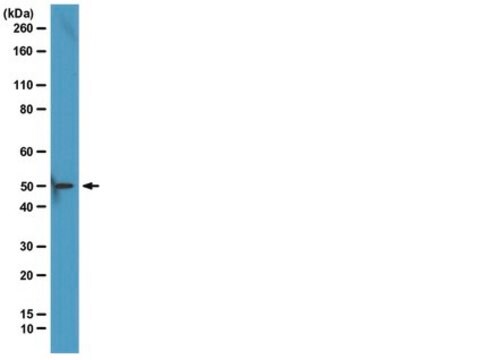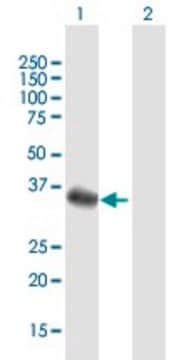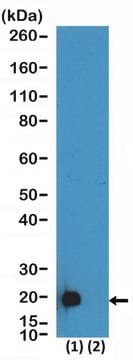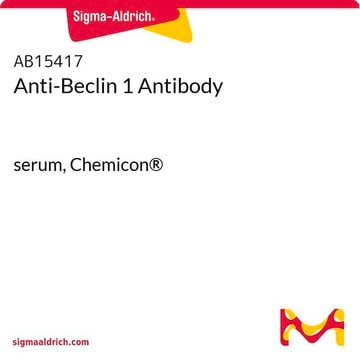17-663
ChIPAb+ EED - ChIP Validated Antibody and Primer Set
from mouse
Synonym(s):
EED, polycomb protein EED, WD protein associating with integrin cytoplasmic tails 1, WAIT-1
Sign Into View Organizational & Contract Pricing
All Photos(3)
About This Item
UNSPSC Code:
12352203
eCl@ss:
32160702
NACRES:
NA.52
Recommended Products
biological source
mouse
Quality Level
clone
monoclonal
species reactivity
human, mouse
manufacturer/tradename
ChIPAb+
Upstate®
technique(s)
ChIP: suitable
immunoprecipitation (IP): suitable
western blot: suitable
isotype
IgG2aκ
NCBI accession no.
UniProt accession no.
shipped in
dry ice
Gene Information
human ... EED(8726)
General description
All ChIPAb+ antibodies are individually validated for chromatin precipitation, every lot, every time. Each ChIPAb+ antibody set includes control primers (tested every lot by qPCR) to biologically validate your IP results in a locus-specific context. The qPCR protocol and primer sequences are provided, allowing researchers to validate ChIP protocols when using our antibody in their chromatin context. Each set also includes a negative control antibody to ensure specificity of the ChIP reaction.
The ChIPAb+ EED set includes the polycomb protein EED antibody, a negative control antibody (purified mouse IgG), and qPCR primers which amplify a 138 bp region upstream of human HoxA2 gene. The EED and negative control antibodies are supplied in a scalable "per ChIP" reaction size and can be used to functionally validate the precipitation of EED associated chromatin.
The ChIPAb+ EED set includes the polycomb protein EED antibody, a negative control antibody (purified mouse IgG), and qPCR primers which amplify a 138 bp region upstream of human HoxA2 gene. The EED and negative control antibodies are supplied in a scalable "per ChIP" reaction size and can be used to functionally validate the precipitation of EED associated chromatin.
Specificity
Not tested in other species.
Recognizes EED, MW: ~50 kDa.
Immunogen
Recombinant fusion protein of full length murine EED tagged with MBP.
Application
Chromatin Immunoprecipitation:
Representative lot data.
Sonicated chromatin prepared from Ntera2 cells (3 X 106 cell equivalents per IP) was subjected to chromatin immunoprecipitation using 1 µg of either a normal mouse IgG, or Anti-EED antibody and the Magna ChIP G Kit (Cat. # 17-611).
Successful immunoprecipitation of EED associated DNA fragments was verified by qPCR using GAPDH promoter (negative) and HoxA2 (positive) Primers (Please see figures). Data is presented as percent input of each IP sample relative to input chromatin for each amplicon and ChIP sample as indicated.
Please refer to the EZ-Magna G ChIP (Cat. # 17-409) or EZ-ChIP (Cat. # 17-371) protocol for experimental details.
Western Blot Analysis:
Representative lot data.
Lysates from A431 cell lysate were resolved by electrophoresis, transferred to PVDF and probed with anti-EED. Proteins were visualized using goat anti-mouse secondary antibody conjugated to HRP and chemiluminescence detection (Please see figures).
Representative lot data.
Sonicated chromatin prepared from Ntera2 cells (3 X 106 cell equivalents per IP) was subjected to chromatin immunoprecipitation using 1 µg of either a normal mouse IgG, or Anti-EED antibody and the Magna ChIP G Kit (Cat. # 17-611).
Successful immunoprecipitation of EED associated DNA fragments was verified by qPCR using GAPDH promoter (negative) and HoxA2 (positive) Primers (Please see figures). Data is presented as percent input of each IP sample relative to input chromatin for each amplicon and ChIP sample as indicated.
Please refer to the EZ-Magna G ChIP (Cat. # 17-409) or EZ-ChIP (Cat. # 17-371) protocol for experimental details.
Western Blot Analysis:
Representative lot data.
Lysates from A431 cell lysate were resolved by electrophoresis, transferred to PVDF and probed with anti-EED. Proteins were visualized using goat anti-mouse secondary antibody conjugated to HRP and chemiluminescence detection (Please see figures).
Research Category
Epigenetics & Nuclear Function
Epigenetics & Nuclear Function
Research Sub Category
Chromatin Biology
Chromatin Biology
This ChIPAb+ EED -ChIP Validated Antibody & Primer Set conveniently includes the antibody & the specific control PCR primers.
Packaging
25 assays per set. Recommended use: ~2 μg antibody per chromatin immunoprecipitation (dependent upon biological context).
Quality
Chromatin Immunoprecipitation:
Sonicated chromatin prepared from Ntera2 cells (3 X 106 cell equivalents per IP) were subjected to chromatin immunoprecipitation using 2 µg of either a normal mouse IgG, or Anti-EED antibody and the Magna ChIP® G Kit (Cat. # 17-611).
Successful immunoprecipitation of EED-associated DNA fragments was verified by qPCR using Control Primers (Please see figures).
Please refer to the EZ-Magna ChIP G (Cat. # 17-409) or EZ-ChIP (Cat. # 17-371) protocol for experimental details.
Sonicated chromatin prepared from Ntera2 cells (3 X 106 cell equivalents per IP) were subjected to chromatin immunoprecipitation using 2 µg of either a normal mouse IgG, or Anti-EED antibody and the Magna ChIP® G Kit (Cat. # 17-611).
Successful immunoprecipitation of EED-associated DNA fragments was verified by qPCR using Control Primers (Please see figures).
Please refer to the EZ-Magna ChIP G (Cat. # 17-409) or EZ-ChIP (Cat. # 17-371) protocol for experimental details.
Target description
~50 kDa
Physical form
Anti-EED (Mouse monoclonal IgG). One vial containing 50 μg of protein G purified antibody in 0.1 M Tris-Glycine (pH7.4) 150 mM NaCl, containing 0.05% azide. May contain 30% glycerol (see certificate of analysis for details). Store at -20°C.
Normal mouse IgG. Two vials containing 25 μg of purified mouse IgG in 25 μL of storage buffer containing 0.1% sodium azide. Store at -20°C.
ChIP Primers, HoxA2 upstream. One vial containing 75 μL of 5 μM of each primer specific for the promoter region of human HoxA2. Store at -20°C.
FOR: AGG AAA GAT TTT GGT TGG GAA G
REV: AAA AAG AGG GAA AGG GAC AGA C
Normal mouse IgG. Two vials containing 25 μg of purified mouse IgG in 25 μL of storage buffer containing 0.1% sodium azide. Store at -20°C.
ChIP Primers, HoxA2 upstream. One vial containing 75 μL of 5 μM of each primer specific for the promoter region of human HoxA2. Store at -20°C.
FOR: AGG AAA GAT TTT GGT TGG GAA G
REV: AAA AAG AGG GAA AGG GAC AGA C
Format: Purified
Storage and Stability
Stable for 1 year at -20°C from date of receipt. Handling Recommendations: Upon first thaw, and prior to removing the cap, centrifuge the vial and gently mix the solution. Aliquot into microcentrifuge tubes and store at -20°C. Avoid repeated freeze/thaw cycles, which may damage IgG and affect product performance. Note: Variability in freezer temperatures below -20°C may cause glycerol containing solutions to become frozen during storage.
Analysis Note
Control
Includes negative control mouse IgG antibody and primers specific for human HoxA2 upstream region.
Includes negative control mouse IgG antibody and primers specific for human HoxA2 upstream region.
Other Notes
Concentration: Please refer to the Certificate of Analysis for the lot-specific concentration.
Legal Information
MAGNA CHIP is a registered trademark of Merck KGaA, Darmstadt, Germany
UPSTATE is a registered trademark of Merck KGaA, Darmstadt, Germany
Disclaimer
Unless otherwise stated in our catalog or other company documentation accompanying the product(s), our products are intended for research use only and are not to be used for any other purpose, which includes but is not limited to, unauthorized commercial uses, in vitro diagnostic uses, ex vivo or in vivo therapeutic uses or any type of consumption or application to humans or animals.
Storage Class Code
10 - Combustible liquids
Certificates of Analysis (COA)
Search for Certificates of Analysis (COA) by entering the products Lot/Batch Number. Lot and Batch Numbers can be found on a product’s label following the words ‘Lot’ or ‘Batch’.
Already Own This Product?
Find documentation for the products that you have recently purchased in the Document Library.
Jian Xu et al.
Molecular cell, 57(2), 304-316 (2015-01-13)
Polycomb repressive complex 2 (PRC2) plays crucial roles in transcriptional regulation and stem cell development. However, the context-specific functions associated with alternative subunits remain largely unexplored. Here we show that the related enzymatic subunits EZH1 and EZH2 undergo an expression
Di Qu et al.
Nucleic acids research, 47(6), 3013-3027 (2019-02-23)
Long noncoding RNAs (lncRNAs) may either repress or activate HIV-1 replication and latency; however, specific mechanisms for their action are not always clear. In HIV-1 infected CD4+ T cells, we performed RNA-Sequencing (RNA-Seq) analysis and discovered an up-regulation of MALAT1
Adrian P Bracken et al.
Genes & development, 20(9), 1123-1136 (2006-04-19)
The Polycomb group (PcG) proteins form chromatin-modifying complexes that are essential for embryonic development and stem cell renewal and are commonly deregulated in cancer. Here, we identify their target genes using genome-wide location analysis in human embryonic fibroblasts. We find
Diego Pasini et al.
Molecular and cellular biology, 27(10), 3769-3779 (2007-03-07)
Polycomb group (PcG) proteins form multiprotein complexes, called Polycomb repressive complexes (PRCs). PRC2 contains the PcG proteins EZH2, SUZ12, and EED and represses transcription through methylation of lysine (K) 27 of histone H3 (H3). Suz12 is essential for PRC2 activity
Haidan Liu et al.
Oncotarget, 7(35), 56338-56354 (2016-07-30)
Polycomb group (PcG) proteins are highly conserved epigenetic effectors that maintain the silenced state of genes. EZH2 is the catalytic core and one of the most important components of the polycomb repressive complex 2 (PRC2). In non-small cell lung cancer
Our team of scientists has experience in all areas of research including Life Science, Material Science, Chemical Synthesis, Chromatography, Analytical and many others.
Contact Technical Service








